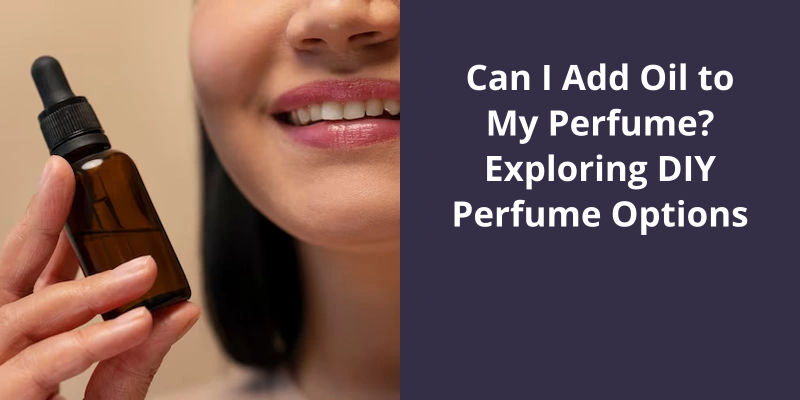Yes, you can add oil to your perfume, but you need to be careful to maintain the balance of the fragrance. Perfume is a delicate combination of various elements and adding oil can change its properties. Essential oils are usually best suited for this, and can enhance the perfume’s scent. However, they should be used sparingly, and not all oils would be compatible with your specific perfume. It’s best to test a small amount first to ensure it mixes well and doesn’t spoil the fragrance. Be aware that some people may experience an allergic reaction to some oils. Always make sure to dilute essential oils properly and do a patch test to avoid skin irritation.

Can I Put Oil in My Perfume Bottle?
The primary function of carrier oil in perfume oil is to dilute the essential oils, which can be too potent when used on their own. Carrier oils also provide numerous benefits to the skin, making them a popular ingredient in skincare products.
Adding too much carrier oil can dilute the scent and make it less potent, while adding too little can make the perfume too strong, leading to an overpowering smell. Additionally, carrier oils have their own distinct scent, which can alter the final fragrance profile of the perfume.
Some people prefer to use perfume oils instead of alcohol-based perfumes due to the long-lasting scent and skin-nourishing benefits of the carrier oil. However, it’s essential to choose a high-quality carrier oil, such as jojoba oil, grapeseed oil, or sweet almond oil, to reduce the risk of skin irritation or allergic reactions.
Before attempting to add oil to a perfume bottle, it’s important to research and follow the instructions provided by the manufacturer. Some perfume bottles may not be suitable for use with oils, which can cause damage or alter the scent over time. It’s also important to store the perfume oil in a cool, dry place away from direct sunlight to maintain the integrity of the fragrance.
It’s important to research and follow the instructions provided by the manufacturer when attempting to create perfume oil at home.
Now that we know fragrance oils can be used as a perfume, it’s important to ask whether it’s safe to use them as a replacement for traditional perfumes. Let’s dive deeper into the topic and explore the pros and cons of using fragrance oils as perfume.
Is It Okay to Use Fragrance Oil as Perfume?
However, it’s important to note that not all fragrance oils are formulated for use on the skin. Some may contain ingredients that can cause irritation or allergic reactions. It’s always best to check the label and do a patch test before applying any fragrance oil directly to the skin.
Additionally, fragrance oils are often less expensive than traditional perfumes and can provide a wider range of scents to choose from. With fragrance oils, it’s possible to create a unique and personalized scent by combining different oils to create a signature fragrance.
However, it’s important to keep in mind that fragrance oils may not have the same longevity as traditional perfumes. They often have a shorter lifespan and may need to be reapplied more frequently throughout the day.
However, it’s important to use caution and only use oils that are formulated for use on the skin, and to be aware of any potential irritants or allergic reactions.
The History of Fragrance Oils and How They Differ From Traditional Perfumes
- Fragrance oils have been used for centuries in various forms, including in incense and perfumes.
- Unlike traditional perfumes, fragrance oils are made from synthetic and natural ingredients.
- Some benefits of fragrance oils include a longer-lasting scent and a more affordable price point.
- Fragrance oils can be used in a variety of ways, including in skincare products and home fragrances.
- The history of fragrance oils can be traced back to ancient Egypt, where they were used for religious and medicinal purposes.
- During the Middle Ages, fragrance oils became popular in Europe, and their use continued to evolve over time.
- Today, fragrance oils are an essential component of the fragrance industry and are used in a variety of products.
When it comes to making your own perfume, choosing the right carrier oil is crucial in ensuring that your fragrance lasts longer and smells fabulous. While there are different types of carrier oils available, Jojoba oil is one of the most popular and recommended due to it’s unique properties. Not only does it have a long shelf life, but it also has a light texture that easily absorbs into the skin, making it perfect for mixing with your favorite essential oils. In this article, we will explore the benefits of using Jojoba oil as a carrier oil for your homemade perfume.
Which Oil Is Best to Be Mix With Fragrance?
Jojoba oil, in addition to being an excellent carrier oil for fragrances, is also known for it’s many skin benefits. It’s a natural oil that contains vitamins E and B, antioxidants, and minerals that help promote skin health. It’s a lightweight oil that’s easily absorbed, making it an ideal candidate when creating homemade perfumes. Moreover, it works well for people who’ve a variety of skin types, including sensitive skin.
Another recommended carrier oil for fragrances is sweet almond oil. It’s an excellent moisturizer and is high in fatty acids, which are essential for maintaining healthy skin. Some people like using it as a base when creating natural or organic perfumes due to it’s hypoallergenic properties.
It’s a light oil that won’t clog pores and is easily absorbed. Moreover, grapeseed oil can help to balance out the more robust fragrances in perfume recipes, making it very versatile.
Sunflower oil has a light texture that won’t leave your skin feeling greasy or oily. It’s super hydrating, and it’s rich in vitamins A, D, and E, making it an excellent carrier oil for fragrances. It’s affordable and readily available, making it an excellent option if youre on a budget.
Last but not least, coconut oil is a popular oil for use as a carrier oil in fragrances. Despite it’s thicker consistency, it’s hydrating for the skin and has significant natural antifungal properties. Coconut oil is a great choice for those who prefer an oil with a lower risk of allergic reactions. Regardless of which carrier oil you choose, always test the fragrance on a small area of skin before using widely to reduce the risk of irritation.
Ensuring the right balance of fragrance oil is crucial when creating your own perfume. With a little knowledge on the right concentration and measurement, you can make a great-smelling fragrance that won’t compromise your safety. Let’s dive into the specifics of how much fragrance oil you should add to your perfume.
How Much Fragrance Oil to Add to Perfume?
When it comes to making perfume, one of the key considerations is the proper amount of fragrance oil to add. This can be a tricky process, as adding too much oil can result in an overpowering scent that’s unpleasant to wear. On the other hand, not adding enough oil can lead to a weak or insipid fragrance that fails to make an impact.
One commonly used guideline is to aim for a concentration of no more than 20% essential oils in the carrier oil. This level is considered safe for most skin types and helps to ensure that the resulting perfume has a pleasant, balanced scent.
For a 5 mL bottle, for example, you’ll typically need to account for 100 drops of liquid. This means that you’ll need to measure out your fragrance oil carefully using a pipette or glass dropper, and adjust the amount based on the size of your container.
It’s also important to note that the type of fragrance oils you use can have an impact on the overall scent of your perfume. Different oils have different properties, such as floral, fruity or woody notes, and it’s important to choose oils that complement each other well. In addition, the ratio of oils you use can also affect the final scent, so careful experimentation may be necessary to find the perfect blend.
From there, you can experiment with different types and ratios of oils to create a scent that’s all your own.
Tips for Blending Fragrance Oils to Create a Unique Perfume Scent
- Start with a base note oil, such as sandalwood or musk, and add a few drops to a glass dropper.
- Add a heart note oil, such as rose or jasmine, to the dropper.
- Finish with a top note oil, such as bergamot or lemon, to the dropper.
- Drop the oils onto a cotton swab or testing strip to see how they blend together.
- If needed, adjust the blend by adding more of one of the notes until desired scent is achieved.
- When satisfied, blend the oils together in a small glass bottle and let sit for at least 24 hours to allow the scents to meld.
- Test the perfume on your skin to see how it reacts with your body chemistry.
- Adjust the blend as needed and enjoy your unique fragrance!
Source: How to Make Perfume With Essential Oils for the Ultimate …
The question of whether perfume sticks to body oil is a common one, as many people are looking for ways to make their fragrance last longer throughout the day. One trick that’s been suggested is to layer on an unscented body oil before applying perfume. This can help to hold the scent better, reduce the need for reapplication, and even add a healthy glow to the skin. But does this method really work? Let’s explore the science behind perfume and body oils to find out.
Does Perfume Stick to Body Oil?
Perfume has the power to make you feel confident and attractive, but it can be a challenge to make it last all day. Whether youre out running errands or attending a special event, you don’t want to worry about constantly reapplying your favorite fragrance. The issue that some people face is that body oil can interfere with the fragrance and cause it to dissipate quickly.
However, the right type of body oil can actually enhance the longevity of your perfume. Unscented body oils can create a barrier between your skin and the fragrance, preventing it from evaporating too quickly. When you apply perfume on top of body oil, it creates a perfect base for the fragrance to hold onto.
To use this method effectively, start by applying a small amount of unscented body oil to your skin. Wait a few minutes for the oil to fully absorb into the skin, and then apply your perfume directly on top.
This technique also works well for those with dry skin, as the oil helps to moisturize and hydrate the skin. Not only will you smell fantastic, but your skin will also look and feel softer and smoother. Some people even choose to use scented body oils to create a customized fragrance blend that’s unique to them.
How to Choose the Right Body Oils to Use With Perfume
When it comes to choosing body oils to use with perfume, it’s important to consider the scent profile, skin type, and even personal preferences. Look for oils that have a scent profile that complements the perfume you plan on using, and consider your skin type to ensure that the oil won’t cause any irritation. It’s also a good idea to test out a small amount of the oil and perfume together to see how they interact before fully committing. Ultimately, the right body oil for you’ll depend on your individual needs and preferences.
Conclusion
So why not experiment with different oils and discover new scent combinations that speak to your personal style? With endless possibilities, the sky's the limit when it comes to creating your own signature scent.





